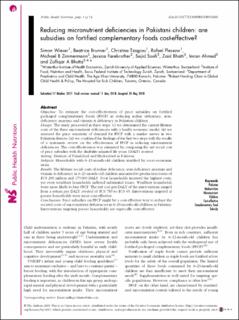Please use this identifier to cite or link to this item:
https://doi.org/10.21256/zhaw-3445| Publication type: | Article in scientific journal |
| Type of review: | Peer review (publication) |
| Title: | Reducing micronutrient deficiencies in Pakistani children : are subsidies on fortified complementary foods cost-effective? |
| Authors: | Wieser, Simon Brunner, Beatrice Tzogiou, Christina Plessow, Rafael Zimmermann, Michael B. Farebrother, Jessica Soofi, Sajid Bhatti, Zaid Ahmed, Imran Bhutta, Zulfiqar A. |
| DOI: | 10.21256/zhaw-3445 10.1017/S1368980018001660 |
| Published in: | Public Health Nutrition |
| Volume(Issue): | 21 |
| Issue: | 15 |
| Page(s): | 2893 |
| Pages to: | 2906 |
| Issue Date: | 2018 |
| Publisher / Ed. Institution: | Cambridge University Press |
| ISSN: | 1368-9800 1475-2727 |
| Language: | English |
| Subjects: | Child; Complementary food; Cost-effective; Malnutrition; Micronutrient; Pakistan; Subsidy |
| Subject (DDC): | 613.2: Dietetics |
| Abstract: | Objective: To estimate the cost-effectiveness of price subsidies on fortified packaged complementary foods (FPCF) in reducing iodine deficiency, iron-deficiency anaemia and vitamin A deficiency in Pakistani children. Design: The study proceeded in three steps: (i) we determined the current lifetime costs of the three micronutrient deficiencies with a health economic model; (ii) we assessed the price sensitivity of demand for FPCF with a market survey in two Pakistani districts; (iii) we combined the findings of the first two steps with the results of a systematic review on the effectiveness of FPCF in reducing micronutrient deficiencies. The cost-effectiveness was estimated by comparing the net social cost of price subsidies with the disability-adjusted life years (DALY) averted. Setting: Districts of Faisalabad and Hyderabad in Pakistan. Subjects: Households with 6–23-month-old children stratified by socio-economic strata. Results: The lifetime social costs of iodine deficiency, iron-deficiency anaemia and vitamin A deficiency in 6-23-month-old children amounted to production losses of $US 209 million and 175 000 DALY. Poor households incurred the highest costs, yet even wealthier households suffered substantial losses. Wealthier households were more likely to buy FPCF. The net cost per DALY of the interventions ranged from a return per DALY averted of $US 783 to $US 65. Interventions targeted at poorer households were most cost-effective. Conclusions: Price subsidies on FPCF might be a cost-effective way to reduce the societal costs of micronutrient deficiencies in 6–23-month-old children in Pakistan. Interventions targeting poorer households are especially cost-effective. |
| URI: | https://digitalcollection.zhaw.ch/handle/11475/13965 |
| Fulltext version: | Published version |
| License (according to publishing contract): | CC BY 4.0: Attribution 4.0 International |
| Departement: | School of Management and Law |
| Organisational Unit: | Winterthur Institute of Health Economics (WIG) |
| Appears in collections: | Publikationen School of Management and Law |
Files in This Item:
| File | Description | Size | Format | |
|---|---|---|---|---|
| Reducing micronutrient_PublHeNu 2018.pdf | 2.65 MB | Adobe PDF |  View/Open |
Show full item record
Wieser, S., Brunner, B., Tzogiou, C., Plessow, R., Zimmermann, M. B., Farebrother, J., Soofi, S., Bhatti, Z., Ahmed, I., & Bhutta, Z. A. (2018). Reducing micronutrient deficiencies in Pakistani children : are subsidies on fortified complementary foods cost-effective? Public Health Nutrition, 21(15), 2893–2906. https://doi.org/10.21256/zhaw-3445
Wieser, S. et al. (2018) ‘Reducing micronutrient deficiencies in Pakistani children : are subsidies on fortified complementary foods cost-effective?’, Public Health Nutrition, 21(15), pp. 2893–2906. Available at: https://doi.org/10.21256/zhaw-3445.
S. Wieser et al., “Reducing micronutrient deficiencies in Pakistani children : are subsidies on fortified complementary foods cost-effective?,” Public Health Nutrition, vol. 21, no. 15, pp. 2893–2906, 2018, doi: 10.21256/zhaw-3445.
WIESER, Simon, Beatrice BRUNNER, Christina TZOGIOU, Rafael PLESSOW, Michael B. ZIMMERMANN, Jessica FAREBROTHER, Sajid SOOFI, Zaid BHATTI, Imran AHMED und Zulfiqar A. BHUTTA, 2018. Reducing micronutrient deficiencies in Pakistani children : are subsidies on fortified complementary foods cost-effective? Public Health Nutrition. 2018. Bd. 21, Nr. 15, S. 2893–2906. DOI 10.21256/zhaw-3445
Wieser, Simon, Beatrice Brunner, Christina Tzogiou, Rafael Plessow, Michael B. Zimmermann, Jessica Farebrother, Sajid Soofi, Zaid Bhatti, Imran Ahmed, and Zulfiqar A. Bhutta. 2018. “Reducing Micronutrient Deficiencies in Pakistani Children : Are Subsidies on Fortified Complementary Foods Cost-Effective?” Public Health Nutrition 21 (15): 2893–2906. https://doi.org/10.21256/zhaw-3445.
Wieser, Simon, et al. “Reducing Micronutrient Deficiencies in Pakistani Children : Are Subsidies on Fortified Complementary Foods Cost-Effective?” Public Health Nutrition, vol. 21, no. 15, 2018, pp. 2893–906, https://doi.org/10.21256/zhaw-3445.
Items in DSpace are protected by copyright, with all rights reserved, unless otherwise indicated.